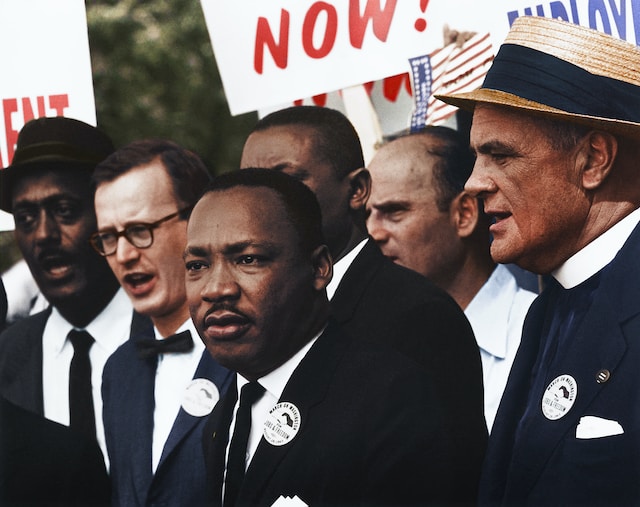Are We Misquoting MLK?: A Discussion on Distortion

MLK Day, January 15, is a time for celebrating the life and legacy of Dr. Martin Luther King Jr., and evoking his teachings. However within the constant stream of MLK photos and quotes that get shared on this day, there is a kind of distortion.
Politicians, business brands, and nonprofits will share MLK’s quotes, without mention of historical context or promise of concrete change, in order to endorse their own agenda. This damages the potent legacy of his advocacy.
It’s the same distortion that Christian nationalists use to manipulate the Christian narrative into something that can fuel discrimination. One question that must be answered in order to address this issue is: Who controls the narrative? Another question is: How do we discern between what’s real and what’s distortion?
Western Christianity and the Roman Way
Through Faith And Reason resource products, we’ve explored scholarly insight into how Western Christianity was captured by Roman imperial values in a way that co-opts the nonviolent heart of Jesus’s teachings.
At the core of the “Roman way,” is violence–it was how they expanded their empire. From the 4th century onward, the church blessed wars of conquest and genocides in the spirit of building “Christian” empires, including our own American Empire.
This, you could say, was one of the first distortions of the Christian narrative, and the resulting culture from this continues to do harm, most recently in the form of Christian nationalism.
About Christian Nationalism
Christian Nationalism is a complex framework based on culture, religion, and political beliefs. According to Christians Against Christian Nationalism, “it contends that America has been and should always be distinctively ‘Christian’ from top to bottom – in its self-identity, interpretations of its own history, sacred symbols, cherished values, and public policies – and it aims to keep it that way.”
To the Christian nationalist, America is “kept Christian” through violent acts: discrimination, authoritarian policies, and using fear to prevent racial, social, or religious diversity. This all harkens back to who controls “the narrative”.
The Importance of Thinking Critically
We all play a role in how the Christian narrative, and MLK’s teachings, are represented in culture and media. Ownership lies with us, but if we as a society do not take time to learn and understand the origins of a narrative or of history, we can be fooled into giving ownership to those who will misuse it.
MLK realized this and mentioned it in his writings published in Morehouse College’s campus newspaper, The Maroon Tiger, in 1947. He argued that education has a greater purpose than just the transferring of information–it has a moral function:
“To think incisively and to think for oneself is very difficult. We are prone to let our mental life become invaded by legions of half-truths, prejudices, and propaganda. At this point, I often wonder whether or not education is fulfilling its purpose. A great majority of the so-called educated people do not think logically and scientifically.
Even the press, the classroom, the platform, and the pulpit in many instances do not give us objective and unbiased truths…Education must enable one to sift and weigh evidence, to discern the true from the false, the real from the unreal, and the facts from the fiction.”
When Jesus is quoted by those who advance violent, discriminating policies, it is a distortion of everything he represents. When Dr. Martin Luther King, Jr. is quoted by those who advance violent, discriminating policies, it is a continuation of the same distortion.
“The unexamined faith…”
Critical thinking matters in politics as much as it does in religion and every other facet of our society. Yet, we see so much in historical and contemporary Christianity that continues to deny the importance of critical thinking about matters of faith and works.
There continues to be, among a significant number of American Christians, the prevalent notion that thinking critically about what one “believes,” is proof of one’s lack of faith. Nothing could be further from the truth.
“The unexamined faith is not worth believing” is a quote attributed to the Rev. D.L. Dykes, Jr., the namesake of Faith And Reason’s parent foundation. It is a theological spin on Socrates’ meditation, “The unexamined life is not worth living.”
Seek out spaces where examining faith is encouraged. The reward is a deeper experience of belief, and a clearer call for the steps we must take to create justice here in our world.
Further Reading
Yoli Bergstrom-Lynch, the Social Justice & Critical Pedagogy Research Librarian at Trinity College, has created this reading list of books by and about Dr. King, and ideas for how to apply his teachings today:
